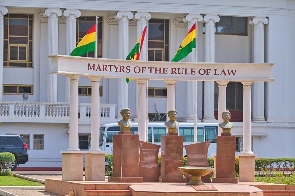- Home - News
- TWI News | TV
- Polls
- Year In Review
- News Archive
- Crime & Punishment
- Politics
- Regional
- Editorial
- Health
- Ghanaians Abroad
- Tabloid
- Africa
- Religion
- Election 2020
- Coronavirus
- News Videos | TV
- Photo Archives
- News Headlines
- Press Release
Opinions of Friday, 5 March 2021
Columnist: Prempeh Charles
Lessons from the election petition: The language factor
Since the election petition - filed by H.E. former president John Dramani Mahama - began at the Supreme Court, l followed all the proceedings with a fawning interest.
I had moments of excitements and times of anxiety. But in all of this, l learned so much from the trial. These lessons include linguistic, moral, faith, legal, and responsibilities. Today, l will focus on the linguistic lesson.
First, the hearing of the petition reinforced my love for eloquence and rhetoric. Rhetoric and law are coterminous. In ancient Greece, lawyers were noted for their eloquence and rhetorical skills - that defined their wit.
In our own cultures, the "akyeame" and griots were the masters of rhetoric.
One's ability to logically, creatively and innovatively use language to persuade one's audience was/is important in litigation. This is much appreciated when it is intermeshed with the repertoires of law!
I was, therefore, impressed by Lawyer Tsatsu Tsikata's rhetorical competence. His sagacity and prescience in pushing through his case was/is admirable.
I also appreciated Lawyer Anthony Akoto Ampaw's meticulous use of language. He did not show much rhetorical competence, but he was forthright with his appropriation of the law. The same could be said about Mr Justice Amenuvor, the lawyer for the first respondent.
Second, l appreciated the brilliance all the lawyers demonstrated in their use of the English language. They showed indubitable sign of having mustered English - speaking with non-native competence.
As part of the rebuff of linguistic imperialism - focusing on the use of English in the lower and higher domains in Ghana - many have sought to discredit the symbiotic relationship between the competence use of language and intelligence.
From the perspective of linguistics, we learn that language is the vehicle through which culture travels. Culture also defines the totality of our being - including the social and technical skills we acquire.
Consequently, one's ability to speak any language with competence is an important index of one's level of intelligence.
As human beings, language is sui generis. While animals are said to have a language of some sort, it is only human beings whose use of language transgresses time.
Impliedly, human beings use language to interpenetrate the three main divisions of time - past, present, and future. This makes it possible for human beings to be creative, adaptive, and innovative in all things. It makes scientific advancements possible.
Given what l have said above, one's competence in speaking English is a major indicative of one's intelligence. This is precisely because, every language follows a set pattern of logic and culture nuances.
More so, English is as much for Ghanaians, as it is for the Queen of England. Since the English imperial era of the nineteenth century and the rise of America as the superpower of the world in the twentieth century, English has become a universal language.
As a universal language, English has become the language of any group that uses it. There is, therefore no "English", there are Englishes.
This is true as different cultures in different locales shape the feature of English. While the rules of grammer are kept, the contextual use of English makes the language adaptable and amenable to different cultures.
There are, therefore, American English (through the kind courtesy of Noah Webster), Canadian English, Ghanaian English, Nigerian English and so on.
The right use of English to comply with the rules of grammer and cultural idiosyncrasies signifies one's intelligence - the ability to communicate clearly, logically, and persuasively.
Again, l was fascinated by the way and manner the lawyers used the English language. Whether through the flowery use of the language or hitting straight at the point, all the lawyers communicated with linguistic competence.
Following the above, l was surprised to read and/or hear about how some young men and women trolling Lawyer Tsatsu Tsikata's rhetorical and competent use of the English language.
I was equally amazed at how some of the youngsters had the temerity to insult Lawyer Akoto Ampaw.
If anything all, there is more to be learned about the language factor in the just ended election petition than just its ultimate judicial determination.
As young men and women, let us determine to muster the languages we speak, for in it lies our linguistic ontology.
Satyagraha










